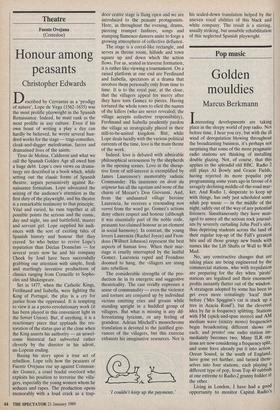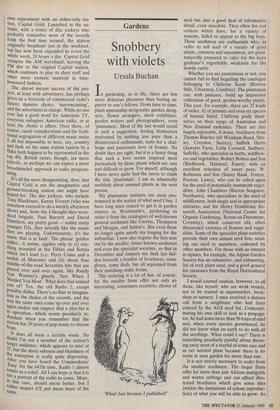Pop music
Golden mouldies
Marcus Berkmann
Interesting developments are taking place in the sleepy world of pop radio. Not before time, I hear you cry, but with the ill wind of deregulation blowing throughout the broadcasting business, it's perhaps not surprising that some of the more pragmatic radio stations are thinking of installing double glazing. Not, of course, that this applies to the splendid old BBC. Radio 2 still plays Al Bowly and Gracie Fields, having rejected its more populist pop programming some years ago in favour of a savagely declining middle-of-the-road mar- ket. And Radio 1, desperate to keep up with things, has only just scheduled some adult pop music — in the middle of the night, safely out of the way of any potential listeners. Simultaneously they have man- aged to annoy all the serious rock journal- ists by severely curtailing John Peel's slot, thus depriving students across the land of their regular top-up of the Fall's greatest hits and all those grungy new bands with names like the Lift Shafts or Wall to Wall Mud.
No, any constructive changes that are taking place are being engineered by the commercial stations, who with trepidation are preparing for the day when 'pirate' stations are legalised and their enormous profits instantly flutter out of the window. A stratagem adopted by some has been to get even more irritatingly 'local' than before (`Mrs Spiggins's cat is stuck up a tree in Acacia Road), but the cleverest idea by far is frequency splitting. Stations with FM (spick-and-span stereo) and AM medium wave (scnzzy mono) frequencies begin broadcasting different shows on each, and presto! one radio station im- mediately becomes two. Many ILR sta- tions are now considering a frequency split, and some have already put it into action. Ocean Sound, in the south of England, have gone yet further, and turned them- selves into four stations, each playing a different type of pop, from Top 40 rubbish at one extreme to Radio 2 granny fodder at the other.
Living in London, I have had a good opportunity to monitor Capital Radio's own experiment with an oldies-only sta- tion, Capital Gold. Launched in the au- tumn, with a roster of disc jockeys who Probably remember most of the records from the first time around, the station originally broadcast just at the weekend, but has now been expanded to cover the Whole week, 24 hours a day. Capital Gold occupies the AM waveband, leaving the FM slot to the original Capital station, Which continues to play its chart stuff and Other more esoteric material in time- honoured fashion.
The almost instant success of the pro- ject, at least with advertisers, has perhaps given us a foretaste of commercial radio's future: massive choice, 'narrowcasting', and the advertisers in charge. While no one ever has a good word for American TV, everyone eulogises American radio, or at least the choice it offers. Over there, of course, racial considerations and the tradi- tional segregation of different music make, it all but impossible to hear, say, country and funk on the same station (unless by a fluke both happen to be represented in the top 40). British tastes, though, are more eclectic, so perhaps we can expect a more broadminded approach to radio program- ming.
It's all the more disappointing, then, that Capital Gold is not the imaginative and ground-breaking station one might have hoped for. The disc jockeys, who include Tony Blackburn, Kenny Everett (who was somehow coerced to do a weekly afternoon Show) and, from the I-thought-they-were- dead brigade, Paul Burnett and David Hamilton, are pretty good — unlike many Younger DJs, they actually like the music they are playing. Unfortunately, it's the music that is at fault. The phrase 'golden oldies', it seems, applies only to (i) any- thing recorded in the Fifties and Sixties Which isn't loud (i.e. Perry Como and a surfeit of Motown) and (ii) about four middle-of-the-road Seventies hits that are Played over and over again, like Randy Van Warmer's ghastly 'Just When I Needed You Most'. What does that remind You of? Yes, the old Radio 2, except possibly duller. There's no flair or imagina- tion in the choice of the records, and the way the same ones come up over and over again makes one suspect that a play-list is in operation, which seems peculiarly re- dundant when you remember that the station has 30 years of pop music to choose from, It does all seem a terrible waste. No doubt I'm not a member of the station's target audience, which appears to start at 35, but the sheer safeness and blandness of the enterprise is really quite depressing. After you have heard the Commodores' Easy' for the 647th time, Radio 1 almost comes as a relief. All I can hope is that it is n, ot a portent of the radio to come. More, m this case, should mean better, but I rather suspect it'll just mean more of the same,



























































 Previous page
Previous page